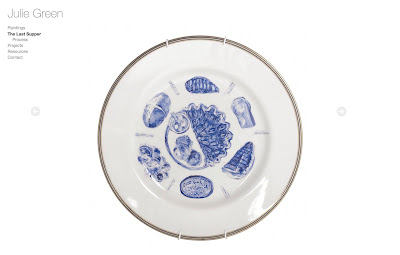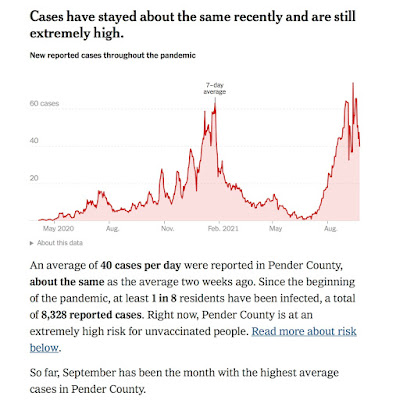December 17, 2021
Being Human
December 14, 2021
Pigs at the Manger
December 12, 2021
A Funeral
December 7, 2021
Spring?
 |
| You can't see them very well, and this is just a tiny area, but there are LOTS of robins out there! |
The yard is full of robins. There must be a hundred or more. Saturday and Sunday, the temperature was in the upper 70s, and Friday it was 80. I spent the afternoon outside, cleaning up the garden beds, weeding, mulching – and sweating! I also watered some plantings. We are in a drought. My brother, who flies for the Forest Service, has been called in to work months ahead of “normal” fire season, fighting blazes across the state. We have a flocked Christmas tree on the porch. It looks as though it is covered in snow, but there will be no snow here. We set our little snowman on the steps. He is made of metal, otherwise he would melt.
December 1, 2021
Molting
November 24, 2021
The Kindred Spirit
Yesterday, a friend took me on a long beach walk to visit a spot known as the Kindred Spirit. It sounds as though it might be a bar, but it’s not! Instead it is a mailbox on an ancient weathered post tucked into some dunes with two benches nearby. Inside the mailbox are several notebooks and a handful of pens. People who visit write whatever messages they want/need and leave them. I wrote in one of the books, a note about gratitude for my visit and the blessing of sea and sky and brisk breezes.
Visiting there reminded me of a story I listened to on “This American Life” about a phone booth in Japan. After the 2011 tsunami, people came there to call their loved ones who were swept away, never heard from again, never found. The phone is not connected to anything … except hope, memory, grief, love. Those who come dial remembered phone numbers and speak into the wind. The Kindred Spirit wasn’t quite like that, but the messages people left, including mine, were offered up to whomever, to the universe, to God.
November 8, 2021
Last Suppers and First Meals
 |
| https://greenjulie.com/last-supper/ |
November 6, 2021
Root-Bound
November 2, 2021
Connections...
October 18, 2021
The Writing Spider
October 9, 2021
The Church
 |
| Sunday School attendance board |
 |
| The Rev. McClure's portrait hanging in the bar..... |
October 4, 2021
Ministry
October 1, 2021
September 28, 2021
A Lack of Love...
 |
| NY Times, 9-25-21, data for Pender County |
September 25, 2021
Sunday Driving
It seems hard to imagine, but folks once went driving, often on Sundays, just for fun. Piling in the car and slowly motoring along, they saw the sights, explored back roads, took their time. “Sunday driver” is now a pejorative term – someone who creeps along and holds things up. Our vehicles are utilitarian vessels, hurtling us from here to there as quickly as possible. They are not usually meant for pleasurable outings. We are all in hurry, and if you don’t believe that, try driving the 70-mile-an-hour speed limit on I-40!
September 19, 2021
This Sunday, three years ago....
September 18, 2021
In the Vineyard
September 11, 2021
The "Before"
September 9, 2021
Weeds
 |
| Nut grass: I have a lot in my garden! |
September 7, 2021
Rush Hour in the Country
On my way to pick up groceries curbside early in the day, I got stuck behind a school bus. I was on a country road with curves and bends, and it was hard to see a safe place to pass. So I followed. The bus stopped at a small house where a man waited with a child in a heavy duty inclined wheelchair, more like a bed than a chair. A lift unfolded toward the back of the bus and was slowly lowered to the ground. The man turned the chair around, pushed it onto the lift, and secured it. He handed the large backpack he had been wearing to unseen waiting hands. The lift slowly rose, and the person inside the bus unfastened the chair and rolled it inside. I assume there was a similar process of securing the chair in the bus. Then the lift was folded up, and the bus moved on.
I don’t know who that family is. I don’t know anything about the adult or adults on the bus. I don’t know if the other children were kind or cruel. And I don’t know what it is like to spend a life in a chair like that. But sitting there and waiting and watching made me wonder.
Courage comes in many forms. Getting up every day to tend to a child in a chair takes courage. Driving a school bus takes courage. Going to school in these pandemic times takes courage. There was so much courage on display during the 20 minutes or so that I sat and waited.
Life for me has slowed some in the past 18 months, but I still find myself rushing around with chores and projects to do. It was good to stop, good to reflect on the quiet lives of courage and caring that are all around me. It was good not to rush.
September 3, 2021
The Glory of God
August 30, 2021
Burnout
During these interminable pandemic months, some folks have been cooking far more than they ever dreamed. Sourdough was big for a while. Three meals a day at home became the norm for many who were working and going to school from a computer on the kitchen table. Grocery shopping felt like an obstacle course: finding the store with good mask and distancing protocols, reserved hours for those at high-risk for the virus, planning on-line lists for curb-side pickup. I enjoy cooking, and most of the time, we all eat at home anyway, so the pandemic did not change much in my kitchen. I have not been grocery shopping in person since early March 2020, but with advanced planning, my kitchen routine is much as it was in the Before. And I still enjoy cooking. But that is not true for everyone.
“Burnout is not the same as stress. …We experience stress with the adjustment to any life change, positive or negative. Getting married causes stress. Job promotions. But with burnout, you stop functioning. You stop doing the things that you typically care about, or you do them, but not very well, or without much feeling. You begin to lose touch with who you are. The most painful part is that burnout attacks things that we typically love so much, the activities that used to bring us joy and pleasure.”
“When you’re depleted and running on fumes,” one of them says, “you can start to feel resentful: you’re doing something you don’t have the reserves to do.” It’s okay, she [says], to not feel okay. And it’s okay to eat toast for dinner.
August 26, 2021
Going With the Flow
August 21, 2021
Scraps
 |
| My most recent project -- made from scraps in my stash! |
August 17, 2021
A Lesson from the Bees
I have often wished that martial arts were taught in seminary…. As a martial arts student, I was taught that a true artist strikes only under extreme necessity and always with the minimum force necessary to protect himself. I was also taught that if I ever have to strike, I have lost.
August 8, 2021
A Tale of Two Men
July 31, 2021
How to live on a farm
July 28, 2021
Connectedness
No man is an island entire of itself; every man is a piece of the continent, a part of the main; if a clod be washed away by the sea, Europe is the less, as well as if a promontory were, as well as any manner of thy friends or of thine own were; any man's death diminishes me, because I am involved in mankind. And therefore never send to know for whom the bell tolls; it tolls for thee.
July 26, 2021
Smoke from a distant fire
July 23, 2021
Sunflowers!
July 22, 2021
Bounty!
July 18, 2021
A Party!
We had a small dinner party for the first time in a very long time. It was lovely, and we started preparing for it far in advance of the date. We invited some folks who didn’t know each other but we thought would have common interests. We planned the menu, shopped, and prepped. We cleaned the porch, arranged flowers, got out the silver and the crystal (to go with the pottery plates!). When the evening arrived, we were ready to welcome our guests and celebrate being together. We had a great time!
Our experience makes me think that worship ought to be like a dinner party – something we look forward to, plan and prepare for, a celebration of being together. We might think about including new people, inviting those who don’t know each other to come together in fellowship. And how wonderful it would be to make it special, to bring out all of our best – singing voices, generous offerings, fervent prayers – rather than treating the occasion as just another day.
There is always the hope and possibility that worship will transcend the ordinary, that something wonderful will happen. When we prepare ourselves, when we anticipate the holy, we are more likely to see how God is always present.
And worship is not like a party that we give for God, but the reverse: Worship is a grand feast that God has prepared for us. Every Sunday we are invited to “taste and see that the Lord is good.” Every Sunday we are welcomed to God’s great banquet, where the best of everything is waiting for us. Every. Single. Sunday!



















